

Scholar addresses question, ‘Who won World War II in Europe?’ There’s no easy answer, said Norman Davies, an Oxford-educated British historian and Poland specialist who has written widely on the 1939-1945 conflict.
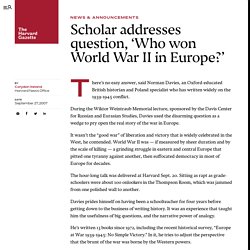
During the Wiktor Weintraub Memorial lecture, sponsored by the Davis Center for Russian and Eurasian Studies, Davies used the disarming question as a wedge to pry open the real story of the war in Europe. It wasn’t the “good war” of liberation and victory that is widely celebrated in the West, he contended. World War II was — if measured by sheer duration and by the scale of killing — a grinding struggle in eastern and central Europe that pitted one tyranny against another, then suffocated democracy in most of Europe for decades.
The hour-long talk was delivered at Harvard Sept. 20. Sitting as rapt as grade-schoolers were about 100 onlookers in the Thompson Room, which was jammed from one polished wall to another. Davies prides himself on having been a schoolteacher for four years before getting down to the business of writing history.
The Fallen of World War II. Visual Archives. Scholar addresses question, ‘Who won World War II in Europe?’ There’s no easy answer, said Norman Davies, an Oxford-educated British historian and Poland specialist who has written widely on the 1939-1945 conflict.
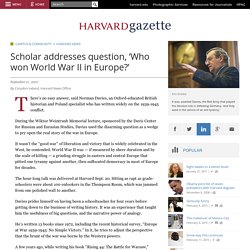
During the Wiktor Weintraub Memorial lecture, sponsored by the Davis Center for Russian and Eurasian Studies, Davies used the disarming question as a wedge to pry open the real story of the war in Europe. It wasn’t the “good war” of liberation and victory that is widely celebrated in the West, he contended. World War II was — if measured by sheer duration and by the scale of killing — a grinding struggle in eastern and central Europe that pitted one tyranny against another, then suffocated democracy in most of Europe for decades. The hour-long talk was delivered at Harvard Sept. 20. Sitting as rapt as grade-schoolers were about 100 onlookers in the Thompson Room, which was jammed from one polished wall to another. Davies prides himself on having been a schoolteacher for four years before getting down to the business of writing history. The Children's Story. Comments to Paul E Marek’s piece: “Why the peaceful majority is irrelevant”
My attention was drawn into a piece in the Internet by Paul E.
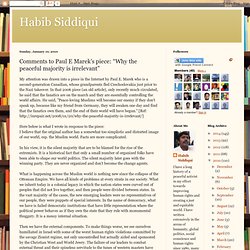
Marek who is a second-generation Canadian, whose grandparents fled Czechoslovakia just prior to the Nazi takeover. In that 2006 piece (an old article), only recently much circulated, he said that the fanatics are on the march and they are essentially controlling the world affairs. He said, "Peace-loving Muslims will become our enemy if they don't speak up, because like my friend from Germany, they will awaken one day and find that the fanatics own them, and the end of their world will have begun. " [Ref: Here below is what I wrote in response to the piece:I believe that the original author has a somewhat too simplistic and distorted image of our world, esp. the Muslim world. Why the Peaceful Majority is Irrelevant. I used to know a man whose family were German aristocracy prior to World War Two.
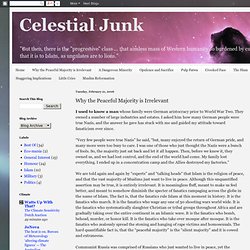
They owned a number of large industries and estates. I asked him how many German people were true Nazis, and the answer he gave has stuck with me and guided my attitude toward fanaticism ever since. “Very few people were true Nazis” he said, “but, many enjoyed the return of German pride, and many more were too busy to care. I was one of those who just thought the Nazis were a bunch of fools. So, the majority just sat back and let it all happen. Worldview.carnegiecouncil.org/archive/worldview/1975/07/2555.html/_res/id=sa_File1/v18_i007-008_a010.pdf. Open School BC History 12 Course Resource. World War II in Europe: Every Day.
Remember the War - Remembering our heroes - 13th November 2011. The successful 70-year campaign to convince people the USA and not the USSR beat Hitler. In 1945, most French people thought that the Soviet Union deserved the most credit for Nazi Germany's defeat in World War II — even though the Soviets didn't play much of a role in France's liberation, relative to the US and Britain.
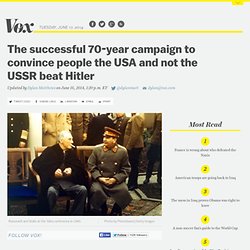
By 1995 and 2004, however, the French had changed their minds, and were crediting the US as the biggest contributor to victory in Europe: Source: Olivier Berruyer, www.les-crises.fr, via A.X. Ian. Night Witches. A Polikarpov Po-2, similar to the aircraft operated by the Night Witches "Night Witches" is the English translation of Nachthexen, a World War II German nickname (Russian Ночные ведьмы), for the female military aviators of the 588th Night Bomber Regiment, known later as the 46th "Taman" Guards Night Bomber Aviation Regiment, of the Soviet Air Forces.
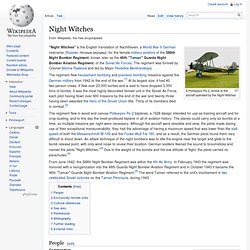
The regiment was formed by Colonel Marina Raskova and led by Major Yevdokia Bershanskaya. The regiment flew harassment bombing and precision bombing missions against the German military from 1942 to the end of the war.[1] At its largest size, it had 40 two-person crews. It flew over 23,000 sorties and is said to have dropped 3,000 tons of bombs.